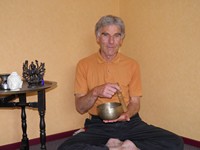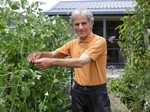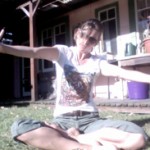
The author in his current yoga studio
By guest author John Guthrie
April 1979, Kundabodha, a Meditation hermitage in Sri Lanka.
This young man had been travelling for some time.
Having already begun to learn the disciplines of Hatha Yoga, he now had a burning desire to learn meditation. In particular Buddhist meditation had an appeal to him.
What drugs could not do, then no doubt meditation would succeed.
After all, in much of what he had read in those recent times, the authors wrote that the illusory nature of mind transforming substances could only lead to suffering.
Lama Anagarika Govinda had acknowledged that psychedelic experimentation with drugs had opened a generation’s mind. But this had been an induced experience, not a living experience arising from one’s own efforts.
Therefore this young man would learn to meditate and then he could find a tree, sit under it and discover bliss.
If one were to learn meditation then one had to seek an authentic teacher.
So, you asked, you sought and you were told. The young man wrote to the teacher and said he was on his way. Yes, this would be it, and before too long this busy mind would no longer be burdened by its perpetual inquiry into this or that.
After several weeks of travel he at last arrived at the hermitage. A bus dropped him off at the front gate and he walked in and introduced himself at reception.
Full of expectation of the experiences awaiting him, he stood silent as he was told that he could not be received that day, and would he please return tomorrow. He felt anguish and dismay as he awaited outside to catch a bus back to town.
Finding lodgings in an inn, he began to walk the streets. Such a mixture of odours graced the air and no doubt his lungs – cooked spices, diesel fumes, sewerage -not exactly pleasant, yet this was life at a very earthbound level. It was very real, there was no illusion to this.
Walking past a bar selling the local spirit his legs took him inside, and so he sat down and joined some locals for a drop – not more than two for it had been a while since his body had consumed alcohol. When he left, he knew his legs could walk, but his mind was a cloud of unknowing as it pondered on what Lama Anagarika Govinda would think about this.
Was he living a Zen paradox at this moment?
Well, he knew that he did not know, at that moment. At the inn he slept.
The next morning, having taken breakfast at a road stall while observing the mass of humanity before him, he pondered on the awareness of eating. He had read that when eating, one should only be aware of the action of eating, and this he had read while eating, how ironic!
Suddenly he remembered a time when he went to visit a holy man who had left his forest abode to spend a little time with his disciples. The young man had been welcomed into the house where the holy man was staying and entered a room and along with many of his disciples sat at the foot of the master. He waited for something profound to happen, but it did not.
Before too long he was placing more attention on the sweetmeats that people had brought as offerings. As much as he tried not to think about those sweetmeats, it became a major focus of his thoughts.
When it came time to leave, he bowed before the holy man who then signaled him to come forward. The holy man smiled at him and he suddenly felt naked and exposed, but the smile continued as if to say all is well.
Then this man of few words before him gathered a generous amount of sweetmeats in his hands and offered them to him; a wish fulfilled. It was a long walk home through those forested mountains, but as he walked he experienced the awareness of the pleasure of eating sweetmeats.
As suddenly as he had entered his thoughts and memories he awoke to where he was at that moment and to where he was going.
So he retraced his steps of the previous day and before long was stepping down from the bus outside the hermitage. He was warmly welcomed and taken to a room where he could leave his belongings. Then he was led to the dwelling of the meditation master.
More anticipation, what to expect?
Sivali Thera was well known, should he ask a question? But he knew no question to ask, for all that he had read indicated that understanding could only come from within his own experience.
Sivali Thera was sitting under a veranda and welcomed him to sit before him.
He did so and the master looked at him with compassion and said:
Have no expectation.
and then proceeded to explain what he should begin to do.
For the next 21 days silence would be observed. For one hour he would sit and observe the breath, for the next hour he would walk, slowly, very slowly and observe the whole process of walking. In fact he would observe all his movements and the thought behind the movement.
Every action of the day would become a meditative process.
The day would begin at 3.a.m.with the sounding of a gong. Throughout the day the gong would sound three times when lay people and monks would come together for group meditation. At 9 p.m. the gong would sound for all to rest.
A tall order, a very tall order he thought. Once a day he would be called by Sivali Thera to see how he was getting on.
Well, it did not sound very romantic but if this is how one learnt to meditate then so be it. By the end of day one, he wondered how he would get through the next twenty days. He was told to follow no other discipline during this time of retreat, not even yoga asanas. Oh how he desired to practise asana, but he observed the master’s words.
As the days passed everything intensified, his mind at times felt alert to the point of discomfort, for there was no distraction here. At times he desired some form of mental distraction. He was happy not to talk, but how nice it would be to read a book.
Sometimes his body felt like fire and the pain was intense. The master would say this is good for so much karma is being burnt, simply enter the pain, be mindful of it. How mindful can you be? He thought.
But soon this young man realised that the pain was not so bad for it was indeed easy to be mindful of it. After all, how could you escape it? In a bizarre way it was almost enjoyable.
He explained his experience to Sivali Thera, who then looked at him and said
Do not be distracted by the illusion of achievement, even if it arises through pain, be mindful, keep working.
And so he did, but this was not an easy journey and it was certainly not bliss.
After twenty-one days it was time to leave. Sivali Thera encouraged him to continue the practice of being mindful, only then would he gain insight.
This young man who, like so many, had been spiritually naïve, matured along the years.
He experienced relationships, family, responsibility, earning what he felt to be a right livelihood and understood a little better what it meant to be of a spiritual nature and yet of the world at the same time.
The journey was not one of bliss and yet there were blissful moments. He realised after many years that meditation is a process, a continuing journey that evolved with each individual’s personal circumstance.
At the core of meditation was an opening heart that enabled one to act out their life that would lead to an understanding of creation. From this, compassion for all living beings would arise.
Those first words of Sivali Thera always remained with him:
Have no expectation.
It is all quite simple really, one just has to practice, as best as one can, knowing that nothing arises without effort.
About John Guthrie:
 John began his yoga journey in December 1977, when by chance, he found himself at ‘The Institute of Yogic Culture in Trivandrum,’ South India. He travelled through India, Ladakh and eventually to Sri Lanka where he spent time in two different hermitages, learning Vipassana meditation. In 1979, he returned for further training to the Yoga Institute in Kerala.
John began his yoga journey in December 1977, when by chance, he found himself at ‘The Institute of Yogic Culture in Trivandrum,’ South India. He travelled through India, Ladakh and eventually to Sri Lanka where he spent time in two different hermitages, learning Vipassana meditation. In 1979, he returned for further training to the Yoga Institute in Kerala.
At the end of 1979 John travelled to Europe and met his wife Dominique in France. In 1981 they arrived in New Zealand and established a biodynamic property in the Waimate district.
In 1992-93 John did the IYTA (NZ) Diploma Teaching Course and in 1997 completed the post graduate short course ‘The Release of Tension through Yoga’.
John currently teaches nine Yoga classes, and two modified Tai Chi classes a week. He is enthusiastic about the place of Yoga in society, has a love of the natural world, enjoys writing poetry and has begun to practice massage once again. You can reach John via email here.


Leave a Reply